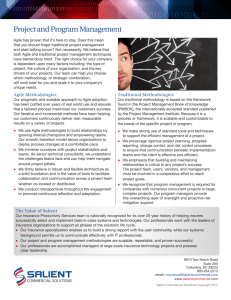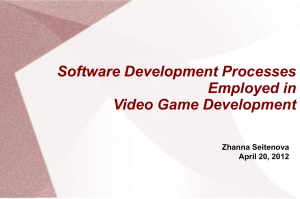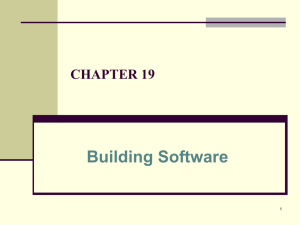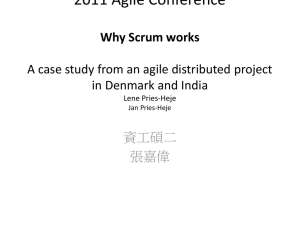Software Development Lifecycle
advertisement
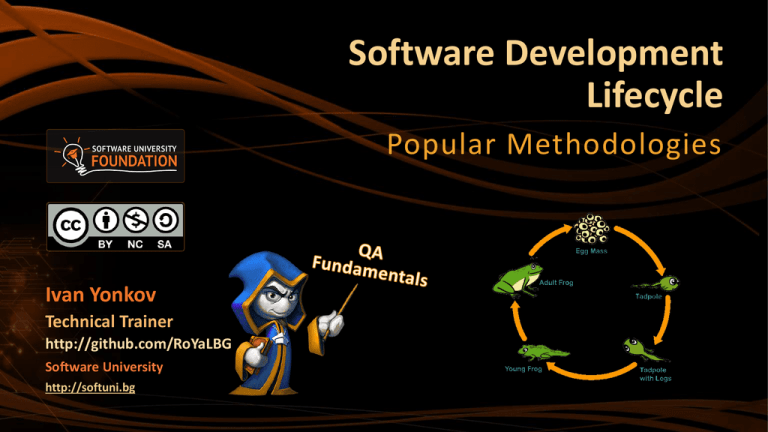
Software Development Lifecycle Popular Methodologies Ivan Yonkov Technical Trainer http://github.com/RoYaLBG Software University http://softuni.bg Table of Contents 1. What is SDLC? 2. Phases 1. Idea 2. Planning 3. Creating 4. Testing 5. Deploying 3. Popular Methodologies 2 Introduction to Software Development Life Cycle Introduction SDLC The assembly line process of an information system Aims to produce product that meets or exceeds the customer expectations Consist of clearly defined and distinct work phases 4 Introduction SDLC (2) Work phases are generally separated to Idea Planning Creating Testing Deploying 5 Introduction SDLC (3) Depending on the size of the project the phases may lack of overlap They are generally interdependent The phases of analysis, planning and design are in most cases longer than the initial creation The continuous delivery compensates it 6 Introduction SDLC (4) System analysis Determining where the problem is Break down it on in pieces to analyze the situation and goals Determining what needs to be created Attempting to engage the user Defining definite requirements 7 Introduction SDLC (4) Design Screen layouts Business rules Process diagrams The output of this stage describes the system as a collection of modules or subsystems It may include pseudo-code and ER diagrams 8 Introduction SDLC (5) Environments Areas where product can be built, distributed, installed configured and tested Development environment Common build environment Integration testing environment User acceptance environment Production environment 9 Introduction SDLC (5) Maintenance The system needs changes and enhancements before its decommissioning or sunset 10 Development Methodologies Waterfall, Scrum, Lean Development, Kanban, Extreme Programming What is a Development Methodology? A development methodology is a set of practices and procedures for organizing the software development process A set of rules that developers have to follow A set of conventions the organization decides to follow A systematical, engineering approach for organizing and managing software projects Heavyweight and agile methodologies Heavy methodologies rely on formal procedures and documents Agile methodologies rely on small iterations and less formalities 12 Development Methodologies Back in history The "Waterfall" Process Heavyweight Nowadays used by big companies Rational Unified Process (RUP) Microsoft Solutions Framework (MSF) Modern development methodologies Agile development processes Scrum, Kanban, Lean Development, Extreme Programming (XP), … 13 The Waterfall Development Process The Waterfall Development Process Software Requirements Software Design Implementation (Coding) Verification (Testing) Operation (Maintenance) 15 Agile Development The Agile Manifesto “Our highest priority is to satisfy the customer through early and continuous delivery of valuable software“ Manifesto for Agile 17 Agile Methodologies Scrum Kanban Lean Software Development eXtreme Programming (XP) Feature-Driven Development (FDD) Crystal Family of Methodologies Adaptive Software Development (ASD) Dynamic System Development Model (DSDM) Agile Unified Process (AUP) 18 Scrum Scrum is an iterative and incremental agile software development methodology for managing product development Very popular in the software industry Scrum roles: Scrum Master – maintains the Scrum processes Product Owner – represents the stakeholders Team – a group of about 7 people The team does the actual development: analysis, design, implementation, testing, etc. 19 Scrum Terminology Sprint An iteration in Scrum Usually few weeks Product Backlog All features that have to be developed Sprint Backlog All features planned for the current sprint 20 The Scrum Process Framework 21 Scrum Practices Sprint Planning Meeting At the beginning of the sprint cycle Establish the Sprint backlog Daily Scrum stand-up meeting Each day during the sprint Project status from each team member Timeboxed to 15 minutes Sprint Review Meeting Review the work completed / not completed 22 Summary What is SDLC? Phases and Stages SDLC Methodologies Waterfall Iterative Process Methodologies Agile 23 Software Development Lifecycle ? http://softuni.org/courses License This course (slides, examples, demos, videos, homework, etc.) is licensed under the "Creative Commons AttributionNonCommercial-ShareAlike 4.0 International" license Attribution: this work may contain portions from "Fundamentals of Computer Programming with C#" book by Svetlin Nakov & Co. under CC-BY-SA license "C# Part I" course by Telerik Academy under CC-BY-NC-SA license 25 Free Trainings @ Software University Software University Foundation – softuni.org Software University – High-Quality Education, Profession and Job for Software Developers softuni.bg Software University @ Facebook facebook.com/SoftwareUniversity Software University @ YouTube youtube.com/SoftwareUniversity Software University Forums – forum.softuni.bg
